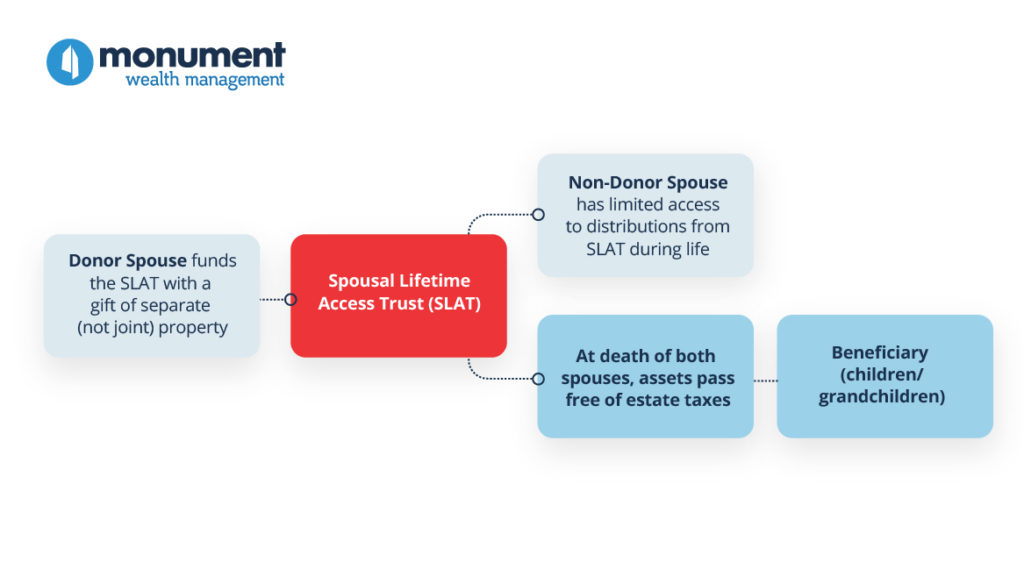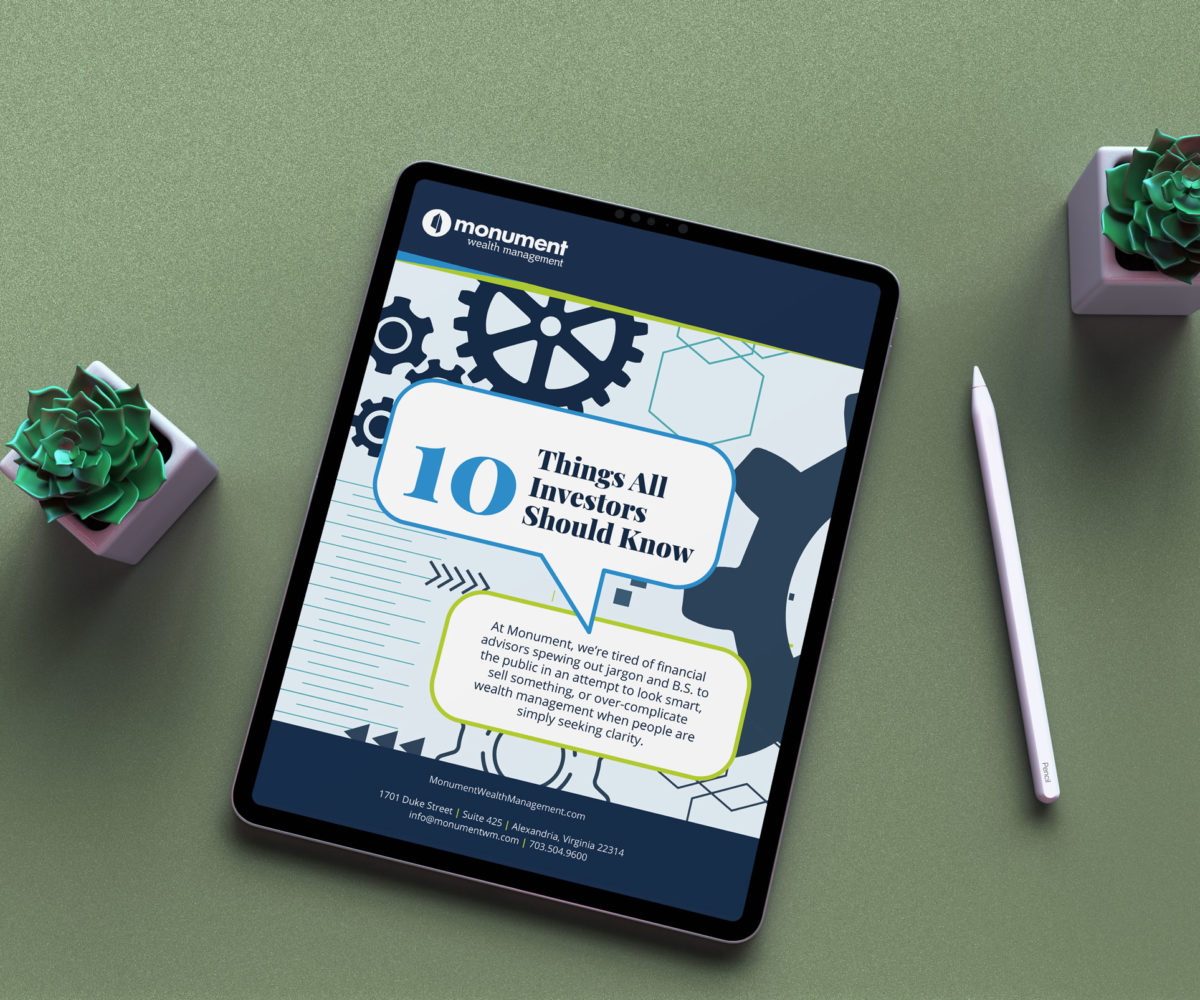Monument Resource Center
Our clients hire us because they recognize the value of our Team’s unique, straight-forward, unfiltered opinion and our tailored advice designed to answer their questions, not everyone else’s. Below, you’ll find some of the most important questions we have been asked over the years to help you better understand the role we play and the advice we give.
The federal estate tax exemption is scheduled to be cut in half in 2026: $5.49M for individuals and $10.98M for married couples (to be adjusted for inflation). So, is there anything you should consider before the exemption amount changes? A Spousal Lifetime Access Trust (SLAT) is one idea you can explore with a qualified Trust and Estate Attorney. (Need a referral to a great attorney? Monument can help!)
What is a Spousal Lifetime Access Trust?
A SLAT is an irrevocable trust where one spouse (aka “Donor Spouse”) makes a gift into the trust that:
- Benefits the other spouse (aka “Non-Donor Spouse”), and
- Removes those gifted assets from their combined estates

Why use a Spousal Lifetime Access Trust?
A SLAT can be an effective tool for multi-generational wealth transfer because assets in a SLAT (and their growth) could be gifted to future generations without estate taxes.
Although a gift to a SLAT is irrevocable—meaning the Donor Spouse can’t take back assets they have given to the trust—the Donor Spouse may indirectly benefit from distributions the Non-Donor Spouse takes from the trust during life.
A SLAT is not a means of paying for a potential estate tax bill, but it is a way of decreasing the size of your taxable estate.
In gifting assets to the SLAT, the Donor Spouse is able to take advantage of the federal lifetime gift and estate tax exclusion, which is currently high—in 2022, the exclusion is $12.06M per person, or $24.12M per married couple. Any appreciation of the asset will take place in the trust and be excluded from the estate of both spouses—and thereby will not be subject to federal estate taxes.
When the lifetime federal estate tax exclusion is lowered in 2026, there will be no clawback of funds the Donor Spouse gifted to the SLAT even if they exceed the new exclusion amount. This means that if the exclusion amount decreases to $5M per person (adjusted annually for inflation), you’ll have already “locked in” the higher exclusion amount.
Who should consider a Spousal Lifetime Access Trust?
You should talk to a qualified Trust and Estate Attorney about the pros and cons of setting up a SLAT if:
- You and your spouse have a combined taxable estate of $12M or more. If your combined estate is well below $12.06M, it’s unlikely that you will need to worry about estate taxes. If you have $24.12M in combined assets right now, you’re in a tight scenario—you may have estate tax issues if you die after 2025 when the estate exemption amount reverts back to pre-2017 levels.
- You have not already used your full federal estate and gift tax exemption.
- You have individually owned assets. These are either titled in your name personally or in your Revocable Trust (assets owned jointly with your spouse can’t be gifted to a SLAT).
- You have assets that you expect to appreciate. Assets in a SLAT and their appreciation will be excluded from your taxable estate.
- You would have sufficient assets outside of the SLAT to maintain your lifestyle. Ideally, the Non-Donor Spouse will not require frequent or any distributions from the SLAT in order to maximize the value of the assets outside the estate. Spending down assets not in the SLAT can also be a means to reduce the value of the taxable estate.
- You would be able to pay the income tax liability for the trust. SLATs are considered a “grantor trust,” meaning that the Donor Spouse will personally pay the income tax liability for the trust, rather than the trust itself paying the income taxes.
What are the risks of a Spousal Lifetime Access Trust?
- If the Non-Donor Spouse passes away, the Donor Spouse no longer has indirect access to the funds in the SLAT.
- In the event of divorce, the Non-Donor Spouse could continue to benefit from the trust and the Donor Spouse will lose indirect access to the funds in the SLAT.
- If both you and your spouse are each setting up a SLAT to benefit each other, you will need to be careful you don’t violate the “reciprocal trust doctrine”—if the IRS thinks the trusts are too similar, this can lead to the trusts being “undone”.
- If the Non-Donor Spouse is the trustee of the SLAT, there could be risks if the trust’s distribution rights are too broad, including eroding creditor protection features of the trust and triggering the SLAT assets to be included in the Non-Donor Spouse’s taxable estate (thereby unwinding the intent of setting up a SLAT)—you might want to consider appointing an independent co-trustee to serve with the Non-Donor Spouse.
- Assets in irrevocable trusts (including SLATs) can quickly reach the top tax bracket (in 2022, if an irrevocable trust’s taxable income exceeds $13,450, the federal tax rate on this income is 37%)—this means that between federal and state taxes, you may pay significant tax on SLAT assets, particularly if the SLAT exists for a long period of time.
- Assets in the SLAT will not get a step-up in basis when you or your spouse pass away, meaning there could be high income taxes when the assets are sold by the trust beneficiaries—although a SLAT can be written to allow the Donor Spouse the power to swap personal assets of equal value with trust assets; this means the Donor Spouse could remove assets with a low basis from the trust and replace them with cash or assets with a high basis as a means to give heirs a step-up in cost basis on the low-basis assets when the Donor passes away.
Don’t rush into this.
Spousal Lifetime Access Trusts are an irrevocable transfer, meaning you can’t change your mind and take those assets back later, so setting up a SLAT—or any other type of irrevocable trust—shouldn’t be done lightly. Careful thought and consideration must go into your unique financial situation and personal goals before you take action.
Want help thinking through your options? Need an introduction to a great Trust and Estate attorney? Monument can help! Reach out to our Team for personalized advice about your estate situation.

Don’t miss our list of “10 Things All Investors Should Know”
Ready for straightforward, unfiltered opinion and tailored advice for YOUR questions, not everyone else’s?
IMPORTANT DISCLOSURE INFORMATION
Please remember that past performance is no guarantee of future results. Different types of investments involve varying degrees of risk, and there can be no assurance that the future performance of any specific investment, investment strategy, or product (including the investments and/or investment strategies recommended or undertaken by Monument Capital Management, LLC [“Monument”]), or any non-investment related content, made reference to directly or indirectly in this blog will be profitable, equal any corresponding indicated historical performance level(s), be suitable for your portfolio or individual situation, or prove successful. Due to various factors, including changing market conditions and/or applicable laws, the content may no longer be reflective of current opinions or positions. Moreover, you should not assume that any discussion or information contained in this blog serves as the receipt of, or as a substitute for, personalized investment advice from Monument. To the extent that a reader has any questions regarding the applicability of any specific issue discussed above to his/her individual situation, he/she is encouraged to consult with the professional advisor of his/her choosing. No amount of prior experience or success should be construed that a certain level of results or satisfaction will be achieved if Monument is engaged, or continues to be engaged, to provide investment advisory services. Monument is neither a law firm nor a certified public accounting firm and no portion of the blog content should be construed as legal or accounting advice.
A copy of the Monument’s current written disclosure Brochure discussing our advisory services and fees is available for review upon request or at www.monumentwealthmanagement.com/disclosures. Please Note: Monument does not make any representations or warranties as to the accuracy, timeliness, suitability, completeness, or relevance of any information prepared by any unaffiliated third party, whether linked to Monument’s website or blog or incorporated herein, and takes no responsibility for any such content. All such information is provided solely for convenience purposes only and all users thereof should be guided accordingly.
Historical performance results for investment indices, benchmarks, and/or categories have been provided for general informational/comparison purposes only, and generally do not reflect the deduction of transaction and/or custodial charges, the deduction of an investment management fee, nor the impact of taxes, the incurrence of which would have the effect of decreasing historical performance results. It should not be assumed that your Monument account holdings correspond directly to any comparative indices or categories. Please Also Note: (1) performance results do not reflect the impact of taxes; (2) comparative benchmarks/indices may be more or less volatile than your Monument accounts; and, (3) a description of each comparative benchmark/index is available upon request.
Please Remember: If you are a Monument client, please contact Monument, in writing, if there are any changes in your personal/financial situation or investment objectives for the purpose of reviewing/evaluating/revising our previous recommendations and/or services, or if you would like to impose, add, or to modify any reasonable restrictions to our investment advisory services. Unless, and until, you notify us, in writing, to the contrary, we shall continue to provide services as we do currently. Please Also Remember to advise us if you have not been receiving account statements (at least quarterly) from the account custodian.
